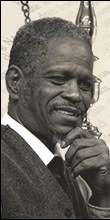
by Mary Rupert
Alvin Sykes feels that finally, after he has worked so hard for years to advance human rights and civil rights, everything is starting to come together.
The Kansas City, Kan., human rights activist was recently honored at the Urban Libraries Council convention in San Jose, Calif. He told the group his story of how he received much of his self-taught education as a teen through the Kansas City, Kan., Public Library, then, in later years, he used the Kansas City, Mo., Public Library extensively to work on human rights and civil rights cases. He was instrumental in getting a civil rights law passed that allowed cold cases to be reopened.
The Kansas City, Mo., Public Library named him a Scholar in Residence in 2013. Sykes has also served on the Wyandotte County Library Board.
Sykes said the highlight of his presentation to the urban libraries convention last week was telling the group that when they return to their home libraries, when they see a library user who is hungry and has papers scattered all over the place, don’t snub them because what they’re working on may someday be signed by the president of the United States.
”They were on their feet applauding for a couple of minutes. I didn’t know how to respond,” he said.
He was asked for his autograph and invited to speak at libraries around the nation, he said.
“That was a really profound experience for me,” Sykes said. “It all started here in KCK when I was a teenager. I never had a clue it would lead to this.”
A documentary film crew taped his presentation, and is planning to come to the Kansas City, Mo., Public Library this month to film a speakers’ event, he said. Stanley Nelson is the executive producer of this film, “Free for All, Inside the Public Library.”
Sykes and former Sen. Tom Coburn of Oklahoma will be speaking July 23 at the Kansas City, Mo., Public Library on “The Power of Dialogue” and how it led to the Emmett Till Unsolved Civil Rights Crime Act of 2007. Sykes worked with Coburn to get the civil rights bill passed. As Sykes explains it, Coburn had put a hold on the Till bill, and Sykes convinced him to become a supporter of it, leading to its enactment.
Sykes currently is assisting with an effort to get the Emmett Till bill extended as a permanent law. The first bill had a 10-year sunset. He wants the law expanded to cover not only racially motivated murders, but also other crimes, including more than civil rights cases. If it is approved, federal resources could be used to investigate cases. In some cases, results could be turned over to the states for prosecution.
On July 24, former Sen. Coburn will appear at a private reception for supporters of Sykes’ autobiography, “Show Me Justice.” That event is raising money for a self-published book. Sykes said the film crew plans to be there.
Sykes said it was Nelson’s earlier documentary film on Emmett Till’s murder, shown on The American Experience on PBS, that inspired him to look into the Emmett Till case.
“To turn out to be him, was just tremendous,” Sykes said. “I’m hoping he’ll come with the crew when they come here on July 23.”
Sykes is a believer in public libraries.
“It’s a lifelong educational tool,” said Sykes, who dropped out of high school as a teenager. “You can always come to the library after you get out of high school and college, there’s no limitation of how you can use it and when you can use the libraries.”
